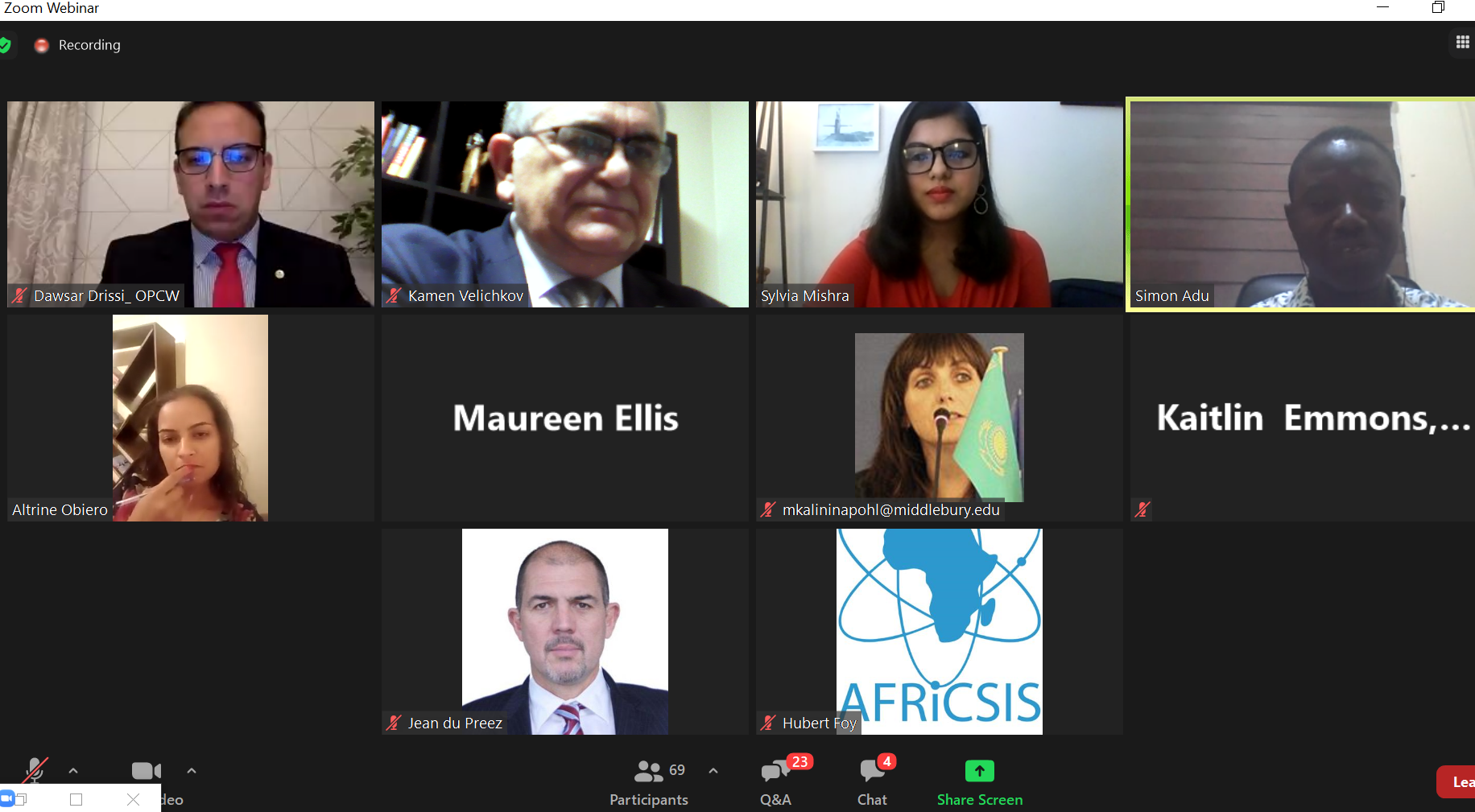ISTC Projects in Africa presented at an Intensive Course for Women in STEM

3 February 2021. A new type of a two-week online course on WMD Non-Proliferation and Security, designed for African participants, began on 25 January 2021, co-organized by the James Martin Center for Nonproliferation Studies (CNS) at the Middlebury Institute of International Studies at Monterey, U.S., and the African Center for Science and International Security. ISTC contributed to the online discussions.
The course’s thematic coverage, ranging from topics such as “Nonproliferation Challenges and Opportunities and Why it is Important for Africa”, through “Impacts of Nuclear Testing and Uranium Mining”, to “Regional Concepts of Nuclear Energy in Africa” coincides with the major objectives of two EU-funded ISTC-implemented projects in Africa, namely Project 60 on nuclear security in Central and East Africa, and Project MC 5.01 15B on nuclear safety in the Southern part of the continent.
.png) Speaking on the panel “Chemical, Biological, Radiological, Nuclear (CBRN) Security”, on 2 February, Kamen Velichkov, Senior Programme Manager and Diplomatic Advisor, ISTC, and Dr. Simon Adu, Nuclear Regulatory Authority, Ghana shared their thoughts on the topic of “Transport Security of Yellowcake in Southern Africa”. This provided an opportunity for information sharing from the Project Support to Southern African States in Nuclear Safety and Safeguards, including results dissemination on the Information Tracking System that was installed within the framework of the Project in six countries of the region to allow better monitoring of trans-border uranium ore transportation. In addition, the findings of the country specific and regional reports aroused interest from the audience, judging from the questions that referred to the need of regional approaches to the issues at stake.
Speaking on the panel “Chemical, Biological, Radiological, Nuclear (CBRN) Security”, on 2 February, Kamen Velichkov, Senior Programme Manager and Diplomatic Advisor, ISTC, and Dr. Simon Adu, Nuclear Regulatory Authority, Ghana shared their thoughts on the topic of “Transport Security of Yellowcake in Southern Africa”. This provided an opportunity for information sharing from the Project Support to Southern African States in Nuclear Safety and Safeguards, including results dissemination on the Information Tracking System that was installed within the framework of the Project in six countries of the region to allow better monitoring of trans-border uranium ore transportation. In addition, the findings of the country specific and regional reports aroused interest from the audience, judging from the questions that referred to the need of regional approaches to the issues at stake.
Another reason why ISTC had some positive results to share is the specific attention of the course to gender factors. The program featured panels entitled “Promoting Peace and Security Through Diversity and Gender Equality”, “Advancing the Role of Women in Security”, and discussion sessions on questions such as “What challenges women working in CBRN fields face?” The great majority of the 83 participants were African women, coming from more than 30 countries. A keynote speaker was the US Ambassador Bonnie Jenkins, winner of the Nuclear Threat Initiative 2020 Annual Award for personal contribution to the NTI cause, through launching the organization Women of Color Advancing Peace and Security. The ISTC-led projects in Africa have a particularly good record to share, whereby more than a quarter of the local experts trained in nuclear safety and safeguards are women. As part of project activities, public advocacy events also attract the participation of female high school and university students. For example, at the Second Summit of the African Young Generation in Nuclear, supported by ISTC in 2019, women delegates were for the first time more numerous than the men.
The on-line course serves as a marketplace of ideas where several international organizations send messages to their African partners. ISTC cooperates or works in parallel with many of them, such as: the International Campaign to Abolish Nuclear Weapons (ICAN), the Vienna Centre for Disarmament and Non-Proliferation (VCDNP), the African Commission on Nuclear Energy (AFCONE), the World Institute for Nuclear Security (WINS) and many more.

